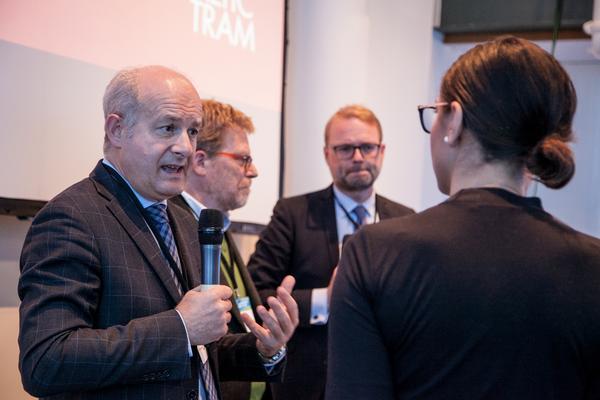
On 9th November 2016 in Stockholm, the project BalticTRAM hosted the session Achieving knowledge-driven innovation and growth in the Baltic Sea Region.
The discussions addressed research-industry collaboration in the Baltic Sea Region: how to unlock the innovation potential of the research infrastructures, how to strengthen links between science and concrete industry needs, how public and private sectors in the region can pool together for joint innovation and regional prosperity, and what structures and funding are needed to stimulate a knowledge-driven economy.
The starting point for the discussion was that investments in innovative capacity boost competitiveness and growth of the Baltic Sea Region. The session was kicked off by an overview of the research infrastructures in the Baltic Sea Region, imbalances between East and West, and by emphasizing that innovation in Europe is lagging behind compared to Japan, USA, China etc.
During the discussion it was emphasized that we should stop making diagnosis of the existing bottlenecks in science-industry collaboration, but instead take actions in a very concrete and operational way by suggesting and promoting solutions. There should be more inputs on how to move from scientific discovery to innovation and further on to commercialization. Funding is an issue to be further studied: how to secure an optimal composition of multiple funds (public, private), how to work with venture capitalists, how to increase number of intermediaries that seem to be a crucial player in science-industry collaboration, what instruments and financing schemes are needed to secure a shorter pay-off period if loans are taken.
The programme had a clear industry perspective and highlighted the importance of risks and impact assessment. It was mentioned that business should have access to the research facilities, but the access need to be provided in the right way and on the realistic conditions. It was stated that unlocking innovation potential need the right regulatory frameworks and incentive structures for getting the innovative products out to the market. In particular, as regards SMEs, the existing regulatory structures need to be more manageable, accountable and further simplified.
Furthermore, an emphasis was made on securing access of companies to excellence and talents, however approach need to be comprehensive in terms of how to ease taxes burden, labor market issues etc. The access of companies to excellence is viewed as crucial if we want to secure state-of-the art solutions as response to globally tougher competition.
The session was summed up by encouraging words to remain ambitious, curious and courageous in facing today’s challenges and in exploring new ways in future collaboration.
The event was arranged in conjunction to the 18th Baltic Development Forum Summit and the 7th Strategy Forum for the EU Strategy for the Baltic Sea Region, and co-organised by Baltic Development Forum, Deutsches Elektronen-Synchrotron (DESY), Region Skåne, Helmholtz-Zentrum Geesthacht (GEMS). The session provided an insightful debate among Di Giulio, Head of Unit, Research Infrastructure B4, DG Research and Innovation, EU Commission, Thomas Hansson, Chair of Region Skåne Regional Development Committee, Tobias Krantz, Director for Education, Research and Innovation, Confederation of Swedish Enterprise and the Baltic TRAM lead partner Uwe Sassenberg, Coordinator, DESY.
